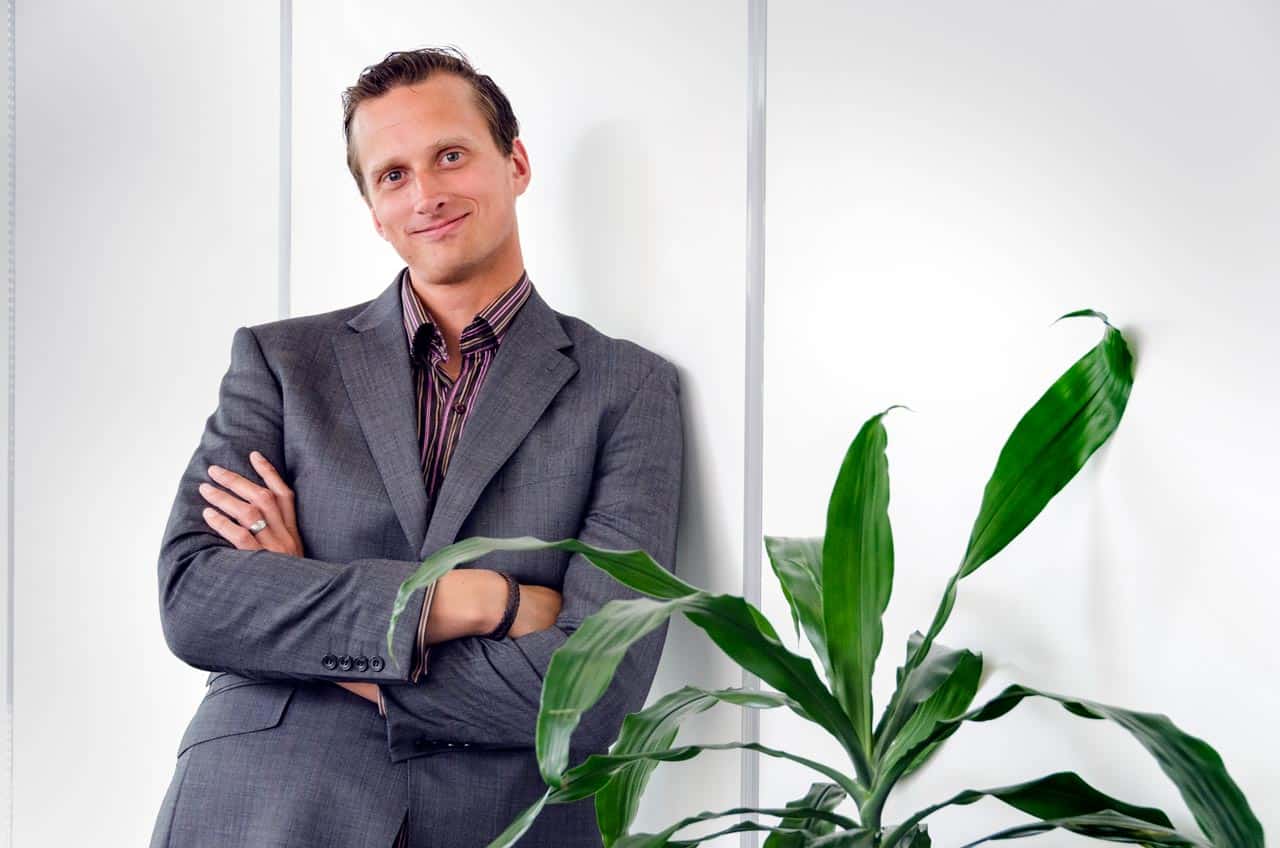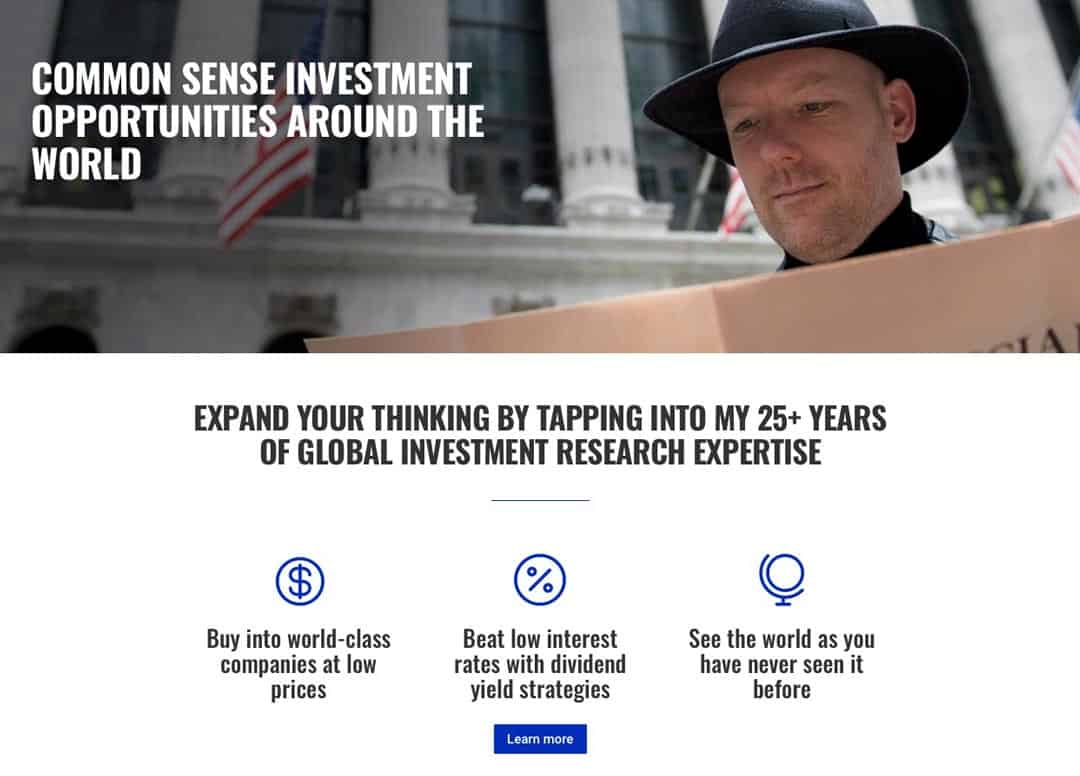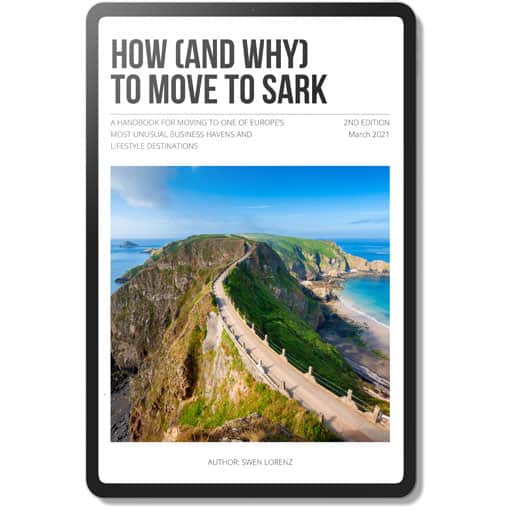How do you spot a gap in a market that many consider boring and unsuitable for online entrepreneurs? Why does it pay to avoid external fundraising? What is the single biggest issue for running a business when travelling frequently? It took Andrew Boast [1] and his wife Claudine [2] a relatively short five years to build SAM Conveyancing [3], a profitable, fast-growing and innovative online business that they can now (almost!) carry around in a briefcase.
Here are ten questions I asked Andrew about his inspiring journey.
1. You have built an online business in quite an unusual market. Explain to us what SAM Conveyancing does and why you chose to build an Internet-based business in this particular “old economy”?
Conveyancing is a little-known word that is often used by solicitors, mortgage brokers and estate agents. Put simply, it describes the most significant financial process that many people will undertake in their lives, i.e. buying or selling a property.
Prior to 1999, if you were to sell or buy a property, you would instruct a local solicitor – either a professional recommended by your real estate agent, or your existing lawyer handling your family affairs. Since then, the evolution of the Internet and technology as a whole has changed the way solicitors are being chosen; consumers now have access to a much wider variety of options.
Back in the old days, you’d have to visit your solicitor during your conveyancing because of the identity verification process, and the need to spend time to discuss the legal transaction and to physically sign your contracts. You can see why most people would want to work with a local solicitor. Nowadays, with online ID checks, email, phone and video, as well as secure online signing, you can work with any lawyer you want regardless of location.
All of a sudden, conveyancing solicitors could be found on the Internet, giving much more power to clients. For example, whilst a solicitor based in the heart of London might charge £1,500, their West Yorkshire counterpart could complete the same legal work for £600. Lower overheads, cheaper staff, same output.
If you ever hear a London estate agent say that you must use their recommended solicitor because “they know the London market”, remember that they want you to use their referred solicitor so they can get their £200 kickback! I know because I’ve worked with one of the top conveyancing firms in London.
I thus spotted a gap in the market for starting my own business. An estimated three out of five consumers now search for a solicitor online. Solicitors could have embraced these changes and positioned themselves online to find these new clients, but most of them missed the boat because of a lack of technology know-how or other reasons. Instead, so-called “lead generators” started to seize the opportunity. These are companies that understand how the Google search algorithm works, dominate search results through clever Search Engine Optimisation, and then sell a lead to a solicitor for a referral fee (something estate agents have been doing for years).
Local law firms often don’t actively promote themselves on the web. Instead, you will find that larger, national law firms with deep pockets are very visible online. Besides those major players, you will find lead generators who, because of the nature of their business, have a tendency to over-promise and under-deliver.
Try searching for “Conveyancing Solicitor in London” and see what organic search results you get. It will likely be a mixture of lead generators, solicitors with SEO know-how and big marketing budgets, and then perhaps right at the bottom of page two you will have one or two actual lawyers who are conveyancing solicitors in London.
Besides the organic search results, you’ll notice the paid adverts at the top of the search page. These Pay Per Click (PPC) adverts will be from marketers who can afford the £10 to £20 per click to buy traffic, hoping to convert them into actual leads. It is here where you’ll find the most competition. Some companies will offer you a starting price of £229 for “All the legal fees”, only to then sell on the lead to law firms for a £200 kickback. In the small print, they will mention the term “Based on the information you provided“. What most consumers who fall for this don’t realise at this stage, is that the clever wording of these lead generators will allow the solicitors to charge what they like for their actual legal work. Their model is based on the art of asking the client fewer questions, which then leads to the solicitors charging more based on (inevitable) extra work not declared at the outset.

The opportunity I spotted to build my online company was very much based around solicitors having missed the boat in the online search market, not understanding the technology evolution that is happening around us, and not being clued in to the concept of modern customer service without the need for a locally based solicitor. Ask anyone who has recently moved home what they thought of their conveyancing solicitor and you’ll most likely hear “It took forever” and “My solicitor never communicated with me”.
Clients are – naturally! – looking for a quick, cost-effective service with good communication. It sounds simple, but before we set up SAM Conveyancing, no one was really embracing this.
Because I worked with law firms during this time, I came to the conclusion that the market was in need of something different. A value proposition with reasonable fees, backed by top-notch service standards and effective communication.
In 2014, I went out on my own and launched SAM Conveyancing in response. SAM Conveyancing is a hybrid business that combines several aspects of the process in a way that no one else had done up to this point. We are a lead generation business with the Search Engine Optimisation know-how to obtain organic leads online, and we have a team to manage the conveyancing process, the lawyers, and the clients. Because we oversee and manage every part of the conveyancing process, we can offer an entirely different proposition to our clients.
We simply accept the fact that most lawyers aren’t good communicators, but still very competent in law. This is why our hybrid model works so well. We have the SAM team to manage the everyday communications to improve the clients’ experience. The lawyers are left to do what they love most – the legal work!
Clients are – naturally! – looking for a quick, cost-effective service with good communication. It sounds simple, but before we set up SAM Conveyancing, no one was really embracing this.
We work with just two law firms, which allows us to better manage the delivery of the service and the consumer experience. Our clients are kept informed throughout the entire process. With this approach, we have built a strong brand name in conveyancing.
We have built an “Excellent” Trustpilot rating, which is almost unheard of in the sector, as well as a 4.8 out of 5 rating on Google from nearly 300 clients. This in a market full of 1 to 3 star reviews and countless scathing customer rants.
As a result, our business simply keeps growing and growing!
The UK conveyancing market is huge, and in terms of market share, we have only just started to scratch the surface.
2. Give us an example (or two) of the difficulties you’ve faced along the way that you didn’t expect at all, and how you solved them?
I set up SAM Conveyancing to answer the communication needs of consumers and give them the best conveyancing experience. The challenge I’ve faced was that although greater communication offers a better conveyancing experience, it had also become a time burden for our team. I found the team were being pushed and pulled for client updates and they weren’t able to focus on acquiring new clients.
The volume of inbound calls and emails to answer non-profit-making questions presented a real challenge. To overcome this issue, I’ve spent some time logging all the questions being asked so that I could identify the top ones. I found that most questions were simple, process-driven ones which could be resolved without the need for human interaction. However, I had to find a way to answer the questions without the need for a call or an email.
I looked at how Amazon and eBay handle the volume of their enquiries. They have mastered the art of online answers. You could spend hours hunting for their customer services number, or you could use their simple online Q&A guides. I could see that I needed to create an online hub, a journey, a visual FAQ, all in one place for consumers to find the answers they need whenever they wanted. From this I developed our online conveyancing process. A personalised hub that guides the user from getting their offer accepted to after they move in.
After we introduced these changes, the number of calls with questions about property searches fell to 1 in 100, from previously 100 in 100.
I wanted this to be more than just the bland Q&A you get in normal FAQs online. I knew that consumers prefer human interaction, or at least a visual guide, rather than just reading text. I thus created short videos where my wife and I answered the most asked questions. It’s always good to have a man and woman talking to break up the messaging to make it easier to digest.
I now had a great hub, but needed to ensure it got used. Annoyingly, clients still wanted to speak on the phone even though the answer was available online. Resolving this took more time but the solution was simple. For example, one of the mandatory parts of the conveyancing process is to order property searches. We changed this process so that our clients now have to log in to our platform to access and download their searches, instead of receiving them by email. Whilst they download their searches, our video about property searches is being played, answering the top questions asked about this part of the process. After we introduced these changes, the number of calls with questions about property searches fell to 1 in 100, from previously 100 in 100.
Introducing such system-driven processes to the conveyancing process both added value to the clients’ journey and increased our efficiency.
3. For your business in particular or for Internet entrepreneurs in general, what are some of the general trends and opportunities you envisage for the next few years?
In the past, the consumers’ buying experience engaged all of their senses. They could see the product, touch it, taste it, smell it, hear it and then ask the sales person in front of them any questions.
Over the last 30 years, the online market has grown and this old buying process is falling away. However, I think that despite the “death of the high street”, consumers still want aspects of the old buying experience. How do you choose a camera online and really get a feel for the quality of its build or weight when you can’t physically touch it? What if you have questions that no online forum provides an answer to? And this is just for products. For services, the “human needs” can be much more complex.
What I do think is important is to give consumers the full buying experience that uses all of their relevant senses. For my business, this is visuals and physically seeing someone. Even when purchasing a service online, people want to see who is delivering the service!
As highlighted before, I’ve created an interactive online conveyancing process (take a look: www.samconveyancing.co.uk/conveyancing-process [4]). I’ve identified that consumers feel comforted by knowing and understanding what the complete journey will look like. That’s why I have created videos and online tasks that take them through this process. However, we are soon to add the next stage, a direct video link between the consumer and their solicitor. All of a sudden, the personal feeling that the consumer wanted to experience is given back to them. They do get a face-to-face meeting to discuss one of the biggest purchases of their life. Our lawyers are real people with whom our clients can connect using technology.
4. Building SAM Conveyancing has allowed you and your wife to live quite a flexible, independent lifestyle. How would you compare your current life to that of being employed by someone else and/or working in a large corporation?
I think you need to experience both of these worlds to fully appreciate a completely mobile lifestyle. I am not quite there yet, but I’m working on it.
Back in the corporate world, the measure of success was sometimes the facetime rather than the output. If you were seen you must surely be doing something for the business. It’s crazy, isn’t it?
I know that Claudine, my wife, has her most inspirational ideas late at night, whereas I prefer to get work completed early in the morning. If you have to work at a fixed time each day, surely you will never utilise your full human potential?
A flexible, independent lifestyle does require discipline. Not everyone is made for it, and some people are better off being sat in an office with clear timelines and supervision. But for me and my wife, it’s all about working at the times that we are the most efficient.
Running an online business, I find I can work at any time of the day – the Internet doesn’t stop. The challenge that I do encounter is that during the hours of 9am to 5pm, our sales force is operational which often requires my involvement and affects my flexibility.
Back in the corporate world, the measure of success was sometimes the facetime rather than the output. If you were seen you must surely be doing something for the business. It’s crazy, isn’t it?
I think that with the right middle management, I can free myself from the operational hours of the business to focus on its development at my most efficient time of the day. Becoming fully independent with good middle management is my goal for this year.

Looking for clever ways to invest your hard-earned cash?
Head over to my investment website Undervalued-Shares.com [5] for common sense investment opportunities from around the world. Ideas that you won’t find anywhere else!
I really appreciate the possibilities offered by cloud-based working. Everything I do, whether it’s on my laptop, work PC or home PC, is all connected to the same database held on the cloud. I can seamlessly switch between different locations and computers. This isn’t just comfortable, but it adds to my efficiency.
Also, I see value in occasionally developing your own software tools. E.g., I developed my own Customer Relationship Management System, called Samson, which is completely integrated with our conveyancing process. I wanted any of my team members to be able to work in the same way – anywhere in the world and even from their mobiles. I often see some of the team sat in their cars before work doing some housekeeping emails on their mobiles so that when they walk in they can focus on higher-value work. Samson has opened up a completely fresh and flexible work environment, which is great for staff and helps us attract and retain the best people.
6. Which future trends do you see on the horizon that will further aide and improve how you live and work?
With my business I can work anywhere in the world. However, my greatest challenge is the quality of the Wi-Fi connectivity during my travels. I can often be found at 5am (or earlier) trying to get the best connectivity before the rest of the village logs on and starts playing Peppa Pig videos.
Dongles for mobile data access are only as good as the signal and usually have the same issue.
I wish that one day, we’ll have a truly portable, global Wi-Fi system that I can carry in my pocket!
7. Which areas of your work do you wish you had had a teacher or mentor before you started, so that you could have avoided learning lessons the hard way?
I have worked in four start-ups so far in my career, and this prior experience helped me being clear from the beginning how I wanted SAM Conveyancing to grow. I know how to generate traffic online, convert leads into paying clients, manage a large team, keep costs low, increase revenue streams and sustainably grow to the point of having over a million pounds ($1.3m) in turnover. I was lucky enough to bring an accountancy mind, a geeky interest in website development, and experienced sales techniques to the table.
Where I see the need for mentoring is for the future, which will entail growing SAM Conveyancing to a totally different size of what it is now and then (possibly!) work our way towards an exit.
I work on the side of caution. Whilst we are fast-growing, we always keep a focus on stability. We do so by avoiding to over-promise and focus on over-delivering. I’ve found that having and managing the right team is critical for fast growth.
Nevertheless, the question is could we achieve an ‘exitable’ size quicker? Could we invest more and buy up more of the market? How do we double in size in a year? I am conscious of the fact that I need some additional direction at this stage of the growth of the business.
8. Raising the capital to start a business is the single most in-demand subject on my website, and there is a certain glamour associated with successfully signing up venture capitalists or other professional investors. Was this part of your journey, too? What’s your view of taking on outside capital?
SAM Conveyancing wouldn’t be here today if we hadn’t received start-up investment. My company started out as “Share a Mortgage” (note the acronym), a company aimed at solving the challenges of unaffordable purchase prices by having friends, family and renters club together to share a mortgage. The investment allowed for us to trial the concept. We were able to invest in developing a complex ‘online dating’ style website, and do PR as well as marketing. We had a good story and with our PR money managed to get into the mainstream press and even on live TV (even though I am terrified of live TV!). Sadly, we needed more to achieve our goal.
My conclusion from this experience is that if you can avoid external fundraising, you should do so.
The challenge I faced with Share a Mortage was that the original investment was only one fifth of the amount I needed. I remember several meetings with investors, keen to invest, but wanting to see ‘tyre tracks on the road’. I found the second round of investment difficult.
Faced with half of the original investment left I chose to create another brand I knew I could build quickly, and that is when SAM Conveyancing was born. This step has made our business the success it is today. We can now afford to invest into the growth of the Share a Mortgage concept, but without outside funders being involved.
My conclusion from this experience is that if you can avoid external fundraising, you should do so. It’s time-consuming, frustrating, and quite simply very difficult. Can you build a business that generates revenue which you can use to fund your growth? This is the path we eventually chose, and it served us extremely well. It also means that we are in control of our business, instead of being controlled by investors.
9. Your wife, Claudine, is currently also working to start up a business. Tell us a bit more about these plans, and how they build on what you’ve already achieved jointly?
If I was to go back and start SAM Conveyancing all over again, I am convinced that not only could I do it, but that I would get to where I am now faster because of what I have learned over the past few years.
I will use this knowledge to now grow our new venture, www.employmentlawfriend.co.uk [6].
Watch out for my wife Claudine, who was a corporate lawyer working for a FTSE 250 company,taking on the legal world with her forward-thinking approaches and the goal of making law accessible and affordable. Ranging from DIY legal documents to subscription to her packaged legal services; full of videos and real-life advice you wouldn’t get from your high street solicitor.
A platform like this is scalable, can be entirely Internet-based, and makes for a truly flexible lifestyle.
Claudine and I want to use the flexible working environment offered by building an online business to ensure that our work revolves around our life, not the other way. Life is too short to work any other way. Though it does take effort to get there!
10. Last but not least, now that you have achieved a different degree of freedom, what are some of the trips you plan to do in the next years, and why?
There are two trips coming up that we cannot wait to go on.
One of them is Japan. I have been told this is the country where they have got it right for all aspects of life, and I am eager to see what it is all about.
The other one is Cambodia, as I have been intrigued to go there and see the country after reading about its past.
I’ll know more first-hand once I’ve been there! In any case, you can expect Claudine and I to be working remotely while we visit these places!
If you liked this article, you will probably also enjoy:
Did you find this article useful and enjoyable? If you want to read my next articles right when they come out, please sign up to my email list [10].
Share this post:

